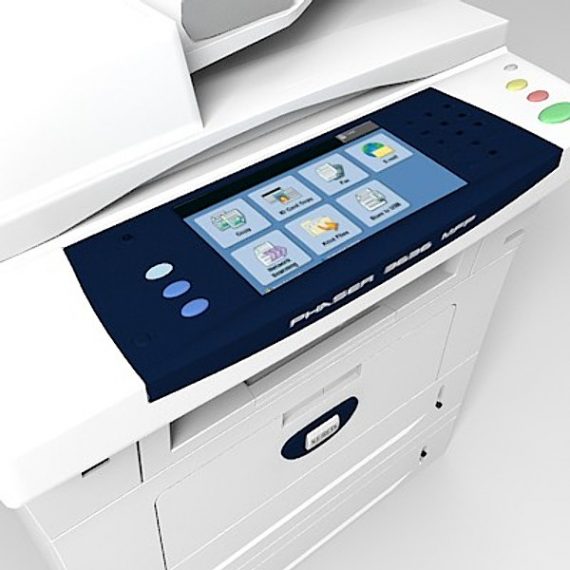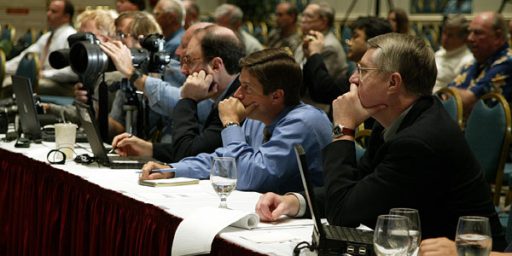When You Say ‘Photocopying Machine’ What Do You Mean?
Lawyers in US court case spent ten pages of transcript arguing what a photocopier is. "Do you have machines where I can put in a paper document, push a button or two, and out will come copies of that paper document, also on paper?"
For those still unsure whether our legal system is a joke, I cite the case of the Cuyahoga County photocopying machine.
Cleveland Plain Dealer (“Identifying photocopy machine poses problem for Cuyahoga County official“):
What is a photocopier?
That seems like such a simple question.
But last year, a lawyer in a public-records case being heard by the Ohio Supreme Court had a hard time getting a $64,000-a-year Cuyahoga County worker to say whether the county recorder’s office had a photocopier.
The effort consumes nearly 10 pages of a court transcript.
The overall case is about whether deeds and other records at the county recorder’s office — records that were collected and are maintained with your taxes — should be readily available at reasonable cost.
The lawyers involved in the case say the question about the photocopier is technical, getting at an arcane point of law.
You be the judge.
What follows is a transcript of the deposition of Lawrence Patterson, acting head of information technology for the recorder’s division of the county fiscal office. The questioner is attorney David Marburger, who filed the lawsuit on behalf of title companies. Another attorney, Matthew Cavanagh, represents the county and raises objections.
Marburger: During your tenure in the computer department at the Recorder’s office, has the Recorder’s office had photocopying machines?
Cavanagh: Objection.
Marburger: Any photocopying machine?
Patterson: When you say “photocopying machine,” what do you mean?
Marburger: Let me be — let me make sure I understand your question. You don’t have an understanding of what a photocopying machine is?
Patterson: No. I want to make sure that I answer your question correctly.
Cavanagh: Dave, I’ll object to the tone of the question. You make it sound like it’s unbelievable to you that he wouldn’t know what the definition of a photocopy machine is.
Marburger: I didn’t ask him to define it. I asked him if he had any.
Patterson: When you say “photocopying machine,” what do you mean?
Marburger: Let me be clear. The term “photocopying machine” is so ambiguous that you can’t picture in your mind what a photocopying machine is in an office setting?
Patterson: I just want to make sure I answer your question correctly.
Marburger: Well, we’ll find out. If you can say yes or no, I can do follow-ups, but it seems — if you really don’t know in an office setting what a photocopying machine is, I’d like the Ohio Supreme Court to hear you say so.
Patterson: I just want to make sure I answer your question correctly.
Cavanagh: There’s different types of photocopiers, Dave.
Marburger: You’re speaking instead of — you’re not under oath. This guy is.
Cavanagh: I understand that, but I understand what his objection is. You want him to answer the question, but I don’t think it’s fair.
Marburger: It’s not fair?
Cavanagh: It’s not a fair question. A photocopy machine can be a machine that uses photostatic technology, that uses xerographic technology, that uses scanning technology.
Marburger: I don’t care what kind of technology it uses. Has your offices — we don’t have technocrats on the Ohio Supreme Court. We’ve got people like me, general guys —
Cavanagh: Objection.
Marburger: — or gals. I’m not really very interested in what the technology element of it is. I want to know —
Cavanagh: That’s what’s at issue in the case, Dave.
Marburger: Not in my judgment. Do you have photocopying machines at the Recorder’s office? If you don’t know what that means in an office setting, please tell the court you don’t know what it means in an office setting to have a photocopying machine.
Patterson: I would like to answer your question to the best of my ability.
Marburger: I’m asking you to answer that.
Patterson: So if you could explain to me what you mean by —
Marburger: I’m not going to do that because I want you — I want to establish on the record that you really don’t know what it is. I want to establish that.
Now, do you know what it is or do you not know what it is? Do you understand what that term means in common parlance or not?
Patterson: Common parlance?
Marburger: Common language.
Patterson: I’m sorry. I didn’t know what that meant. I understand that there are photocopying machines, and there are different types of them just like —
Marburger: Are there any in the Recorder’s office?
Patterson: — there are different cars. Some of them run under gas power, some of them under electric power, and I’m asking if you could help me out by explaining what you mean by “photocopying machines” —
Marburger: That’s a great point.
Patterson: — instead of trying to make me feel stupid.
Marburger: If you feel stupid, it’s not because I’m making you feel that way.
It goes on like this for quite a while. Finally, a resolution:
Marburger: Have you ever–do you have machines there where I can put in a paper document, push a button or two, and out will come copies of that paper document also on paper? Do you have such a machine?
Patterson: Yes, sir.
Marburger: What do you call that machine?
Patterson: Xerox.
Marburger: Xerox. Is the machine made by the Xerox Company? Is that why it’s called Xerox?
Patterson: No.
Marburger: So Xerox, in the parlance that you’ve described, the language that you’ve described, is being used generically as opposed to describing a particular brand; is that right?
Patterson: All of my life I’ve just known people to say Xerox. It’s not commonplace to use the terminology that you’re using.
Marburger: You mean it’s more — people say Xerox instead of photocopy?
Patterson: If you’re referring to a type of machine where you place a piece of paper on the top and press a button and out comes copies of it, they usually refer to it as a Xerox.
Marburger: Have you ever heard it referred to as photocopying?
Patterson: Not with my generation, no.
Geez.
via The Browser







Jeeze, indeed. I hope the Xerox corporation lawyers jump all over that county office with reams of (photocopied) legal documents protecting their trademark and explaining that Xerox is not a generic term. It’d serve the clowns right.
It would’ve taken one page if the interrogating lawyer had simply asked up front what he finally asked at the end, rather than trying to be a smartass.
Third Base!
@Anderson: My interpretation was that the lawyer thought Patterson was the one being a smartass. It took a while for him to realize that Patterson was actually a dumbass.
I wonder if they use Carbon Copies on their email.
That was painful.